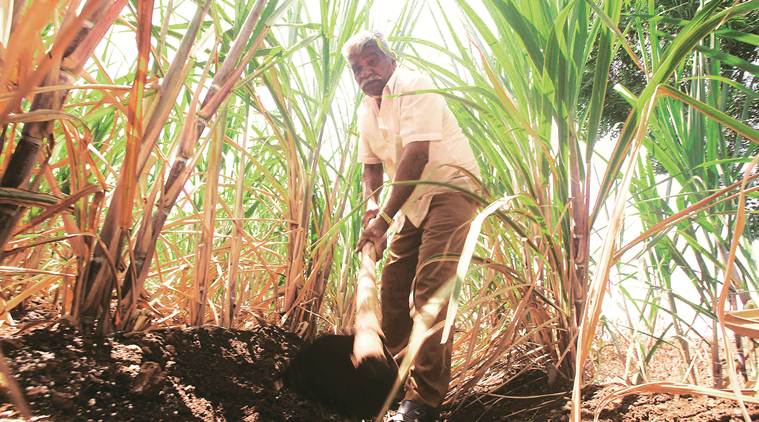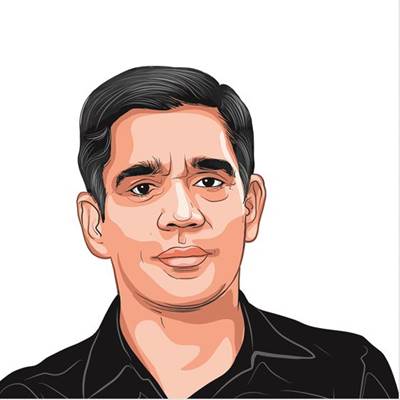For The Farmer’s Future
It is important to evaluate the consequences of the Centre’s agriculture policy.

Even though crop automatically gets insured when farmers avail a loan, the number of farmers insured has dropped. (Photo: Pawan Khengre)
With elections around the corner, it’s too late for a course correction of the farm sector, but it’s an opportune time to document the unintended consequences of half-baked policies for the next five years. Otherwise, the momentum of existing policies will continue to feed rural economic misery.
Agriculture GDP growth plummeted just as India’s agricultural trade surplus, which had recorded a 10x increase between 1991-92 and 2013-14, fell by 70 per cent, mainly due to depressed international commodity prices and back-to-back droughts. The GDP time-series data clearly indicates growth was already declining when UPA II passed the baton to the present regime. Therefore, not all the blame can be heaped on this government. But it’s equally true that the response of those directing the agriculture policy to the dire circumstances not only created a credibility crisis for the government, but aggravated the problem on every farm. As a consequence, farmer suicides continue unabated.
UPA II basically lost the support of the people as it was unable to control inflation, while this regime faces a backlash for artificially deflating the economy. The MSP increase was a knee-jerk reaction to the deflation.
The government excelled in politically attractive slogans like “doubling farmer incomes”. But problems were bound to arise when it tried to implement the impractical message through schemes like Pradhan Mantri Fasal Bima Yojana (PMFBY). Even BJP-ruled states aren’t receptive to the Centre’s polices. Haryana is a good example.
The government excelled in politically attractive slogans like “doubling farmer incomes”. But problems were bound to arise when it tried to implement the impractical message through schemes like Pradhan Mantri Fasal Bima Yojana (PMFBY). Even BJP-ruled states aren’t receptive to the Centre’s polices. Haryana is a good example.
Every positive step like GST has a cost, especially if not thought through properly. Similarly, the architecture of PMFBY is flawed. Haryana insured the crops of 6,40,000 farmers. But only 1,053 farmers (0.16 per cent) voluntarily opted for crop insurance. In 2016-17 the premium collected was Rs 368 crore and even though the corresponding claim pay-out was Rs 280 crore, the premium for the next year rose to Rs 460 crore. Closer to my village, in Sirsa district, crop premiums per hectare increased manifold; for cotton from Rs 1,320 to Rs 5,936 and for maize from Rs 1,000 to Rs 6,225. Surprisingly, there are crops like gram (Rs 9,837/ha) where the premium is more than the actual cost of sowing.
Even though the crop automatically gets insured (without consent) when farmers avail of a crop loan, across India, the number of farmers insured has dropped. BJP-ruled states like Rajasthan and Maharashtra have found ways to circumvent implementing the scheme by issuing notifications only two days in advance of the expiry date of enrolment, thus limiting the fiscal damage. If Rajasthan was to notify PMFBY in time, the premium pay-out may be more than the state’s agriculture budget.
We would rather not guess the reasons for the latest order to stop the export of all livestock indefinitely, impacting the livelihood of millions. The government shouldn’t even pretend that the vigilantes are the voice of a trivial minority. The leadership is busy being in-charge, while it is supposed to be responsible for those in their charge. In these moments of despair, farmers could find solace in the words of J R R Tolkien in The Lord of the Rings: “But in the end, it’s only a passing thing, this shadow; even darkness must pass.”
Academicians supportive of the government and respective ministries may hawk PMFBY, demonetisation, food parks, soil health cards, eNAM and job creation as great successes. But by misrepresenting facts and keeping the leader in the dark, they deceive him. Despite the overwhelming evidence to the contrary, I remain an infinite optimist.
Farmers are wondering why the Union minister for agriculture & farmer welfare is conspicuous by his absence every time significant farmer-related decisions are announced. I am still deeply intrigued at the question posed at a recent meeting in the North Block by one who left for greener pastures: “Why does not someone tell the PM?”
Farmers are wondering why the Union minister for agriculture & farmer welfare is conspicuous by his absence every time significant farmer-related decisions are announced. I am still deeply intrigued at the question posed at a recent meeting in the North Block by one who left for greener pastures: “Why does not someone tell the PM?”
The writer is chairman, Punjab State Farmers’ and Farm Workers’ Commission
For all the latest Opinion News, download Indian Express App
More From Ajay Vir Jakhar
- The MSP IllusionRaising procurement prices of kharif crops will only give false hope to farmers...
- Dealing with the residueCurbing stubble burning is about inducing behavioural changes in farmers...
- Marching against apathyThe country’s politics has ignored the farmers. Perhaps it is time they change the country’s politics ..







































No hay comentarios:
Publicar un comentario